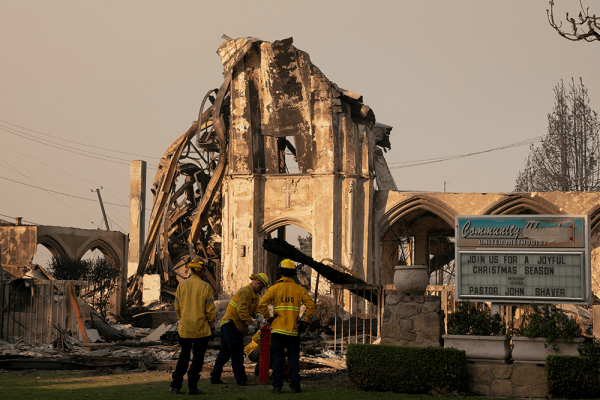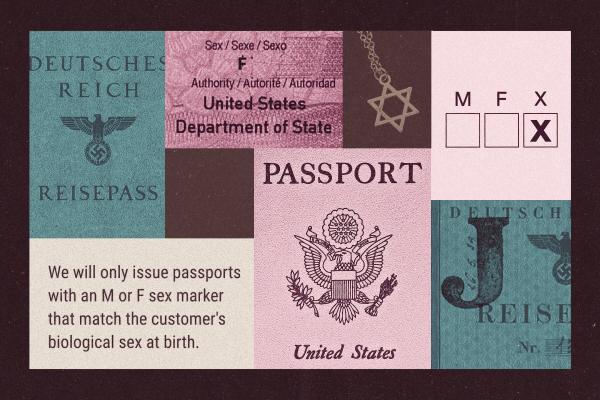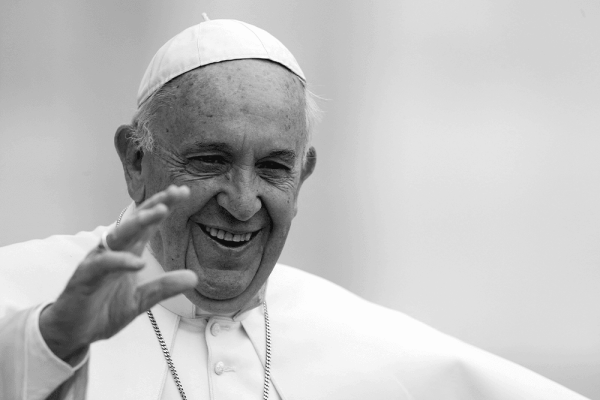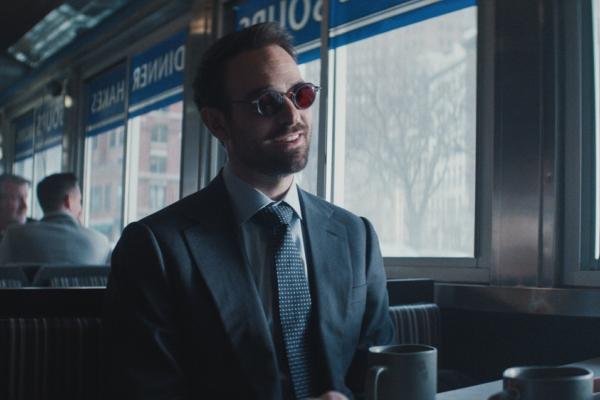As images from the cataclysmic firestorms engulfing Los Angeles County emerged, one word came up consistently in the captions: apocalyptic.
The devastating effects of unusually wet winters followed by record-dry foliage and the incendiary whip of Santa Ana winds created the conditions for what Sammy Roth, the Los Angeles Times’ climate columnist, called “apocalyptic infernos.”
But for faith and justice leaders in LA, the fires were apocalyptic in another way.
“In addition to the houses, lives, and histories lost, this was a reckoning,” said theology professor and interfaith leader Najeeba Syeed, who splits her time between LA and Minnesota and was in LA as the fires erupted.
That reckoning, Syeed told Sojourners, has presented both invitation and challenge to local leaders who are looking to not only meet immediate needs, but build a more just and equitable future for the City of Angels from the ashes.
250117-lafire4.png

Intertwined communities, interfaith responses
The Southern California wildfires have burned down hundreds of homes and dozens of places of worship, displaced one hundred thousand people, contaminated air and water, and left lingering policy questions in their wake.
Since they began in early January, some fires have been contained while others continue burning. Local faith and justice leaders remain busy helping their neighbors and congregations who have lost homes or been displaced.
Rev. Zachary Hoover, executive director of LA Voice, a multiracial, multi-faith community organization partnering with congregations across the metro area, said they are listening to those impacted and looking for ways to meet needs both physical and spiritual.
“As we have always done in times of crisis, spiritual communities and community organizations are pouring abundance into LA County,” Hoover said. While also meeting individual and family spiritual needs, “Hundreds of congregations have set up emergency shelters and are holding donation and fundraising drives.”
Those efforts, however, have been made harder given that many clergy have lost their own homes or houses of worship.
The University of Southern California’s Center for Religion and Civic Culture has compiled an ongoing list of around 20 congregations and faith organizations whose physical property has been damaged or destroyed in the fires so far. This list includes Masjid Al-Taqwa and Theosophical Society Library Center in Altadena, Calvary Church and St. Matthew’s Episcopal Parish in Pacific Palisades, and the Pasadena Church of Christ, among many others. All the congregations on this list, CRCC’s Megan Sweas said, are also supporting members who have also lost homes.
This represents “a huge interfaith loss” for close-knit communities like Altadena and Pasadena, said Syeed. But Syeed also saw the response as an opportunity to live out the call to come together across faith lines to support each other in times of need, as church parking lots and houses of worship have been converted into emergency centers for shelter, distribution, and service.
That kind of selfless, boundary-defying ministry did not just emerge because of the fires, Syeed said. “The mutual compassion was already there,” she said, “we have long been intertwined.
“People knew each other in the neighborhood and worked together before the fires,” she said. “What you’re seeing now is an outpouring of those relationships.”
Looking out for the most vulnerable
These fires have also raised questions about the connections between environmental policies, economic justice, and which communities are getting resources to not only rebuild but protect them from what may be the next catastrophe in a century of climate change.
Amid news reports about celebrity houses or prominent places of worship lost in the conflagrations, there are other stories that can be lost in the fray, said local justice leaders. Stories like that of Theresa and Ebony, a Black family who owned and operated a day care out of their home in Altadena. They shared their story with Joseph Tomás McKellar, executive director of PICO California, the state’s largest faith-based organizing network.
“When they lost their home in the fire, they lost everything,” McKellar said, “their housing, their business, their future financial security. They need help now and in the long term.”
McKellar has heard from others, including undocumented housekeepers and gardeners whose work has been disrupted by the disaster. Many of the large homes destroyed in affluent hillside communities were serviced by immigrants, who will now be out of work or with significantly less income. For them, it seems, the worst is yet to come.
“I met with a housekeeper who worked in Palisades and Pasadena, cleaning four different homes in those places,” McKellar said. “Now, they are all gone.
“While she still has one home left that she cleans, 80 percent of her work is gone and now, she doesn’t know how to pay the rent that’s due on February 1,” he said.
250117-lafire2.png

Faith and justice leaders echoed McKellar, emphasizing how the fire did not discriminate in terms of who it impacted. Whether losing homes, lives, or vehicles, breathing toxic air, or having their income disrupted, everyone in LA has been affected in one way or another, they told Sojourners.
And yet, Hoover said, it is important to remember that some are more impacted than others. “Those who were most vulnerable before this disaster will be the most vulnerable in the weeks, months, and years as we rebuild,” he said.
Grace Park, associate pastor at Pacific Palisades Presbyterian Church, whose church was destroyed by the fires alongside a wide swathe of the Pacific Palisades community, said, “at the moment, like everyone else in the Palisades, I am exhausted.
“The impression is that the Palisades is a rich city, with residents who live in mansions, with millions to rebuild,” she said.
The reality, however, is that many of her parishioners live on fixed incomes and others connected to the congregation — in particular, the custodians and groundskeepers who tended the now razed church — are left with little recourse to rebuild or recuperate.
250117-lafire.png
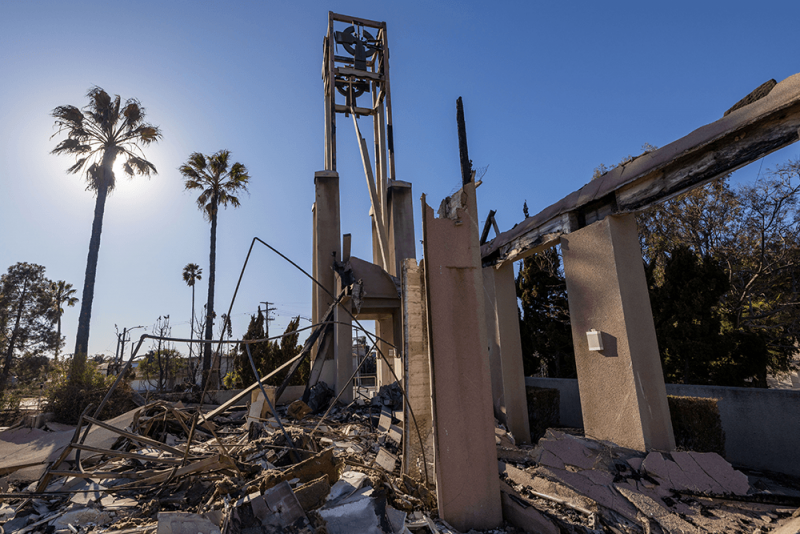
“My people are scattered across California, displaced, in motels, not able to find permanent housing,” she said. “They lost everything: They don’t have a home, they don’t have their church, they don’t have their beloved town.
“These are not C-suite executives, who can pick and choose where they live,” said Park. “These are real people living paycheck to paycheck. And they can’t afford what's coming.”
That is why organizations like Clergy and Laity United for Economic Justice are focusing their current efforts on getting a sense of short- and long-term needs for folks who may not be eligible for certain recovery support or who otherwise have limited access to resources to rebuild and recoup losses in the fires’ wake.
Rev. Jennifer Gutierrez, CLUE’s executive director, said this includes a wide array of Angelenos: people on fixed incomes, short-term renters, immigrants, the unhoused, day laborers, frontline workers like firefighters who face dangerous and toxic conditions, employees of the hospitality industry, small business owners, workers in the gig economy, or Black, Indigenous, and other people of color. In places like Altadena, one of LA’s most racially diverse neighborhoods, many fear the displacement of marginalized groups and a disaster-fed gentrification.
Gutierrez said that for immigrants in particular, especially those who are undocumented or live in mixed-status families, there can a potent fear that registering for relief or seeking funds may negatively impact their immigration process.
“With the incoming [Trump] administration, there is also the fear that they will be labeled a public charge, or a drain on the system, if they seek help right now,” she said.
Gutierrez and McKellar said their respective organizations are working to raise funds to support such vulnerable communities, with temporary and transitional housing, emergency cash assistance, and help dealing with insurance companies and government agencies or negotiating with landlords. Amid an ongoing cost-of-living crisis, rent prices in LA were already astronomically high. But there have been reports of widespread incidents of price gouging, with some rental units in the U.S.’s second-largest city jumping 60% or even more than 100%.
These issues, said Gutierrez, are just the start. “A lot of things will continue to come to light in the days, weeks and months ahead,” she said.
“Recovery must be equitable”
Rabbi Joel Thal Simonds, executive director of the Jewish Center for Justice based in LA, said the fires have laid bare many of the city’s deep, persistent inequalities. That makes recovery efforts “a moral imperative to ensure that everyone impacted by this tragedy — especially those from marginalized communities — is cared for and protected,” he said. “Recovery must be equitable, and we must ensure that promises to cut through red tape translate into meaningful action.”
Faith communities, Simonds told Sojourners, will have a unique role in walking alongside those affected over the long haul.
“We are just emerging from the initial triage phase, and the road ahead will require hard conversations at the state and community levels to ensure neighborhoods and families are not displaced,” he said.
Overall, recovery will take multiple forms, said Najuma Smith, assistant director of community and public engagement with CRCC, including climate education, government support and protections from predatory pricing, long-term spiritual support and grief counseling, executive actions that protect the legacy of marginalized communities in places like Altadena, rent freezes and eviction moratoriums, and a call for guaranteed cash support for impacted people and workers.
Such efforts and actions, Smith said, are just the beginning.
Like other faith leaders hoping the fires might seed the growth for a brighter future, Simonds said, “we must approach this recovery with a justice mindset — ensuring that everyone, from first responders to marginalized workers, is supported, protected, and included in a vision for a more equitable future for Los Angeles.”
Got something to say about what you're reading? We value your feedback!
